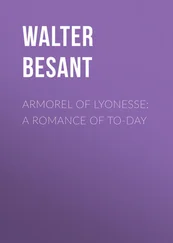Walter Besant - All Sorts and Conditions of Men - An Impossible Story
Здесь есть возможность читать онлайн «Walter Besant - All Sorts and Conditions of Men - An Impossible Story» — ознакомительный отрывок электронной книги совершенно бесплатно, а после прочтения отрывка купить полную версию. В некоторых случаях можно слушать аудио, скачать через торрент в формате fb2 и присутствует краткое содержание. Жанр: foreign_antique, foreign_prose, на английском языке. Описание произведения, (предисловие) а так же отзывы посетителей доступны на портале библиотеки ЛибКат.
- Название:All Sorts and Conditions of Men: An Impossible Story
- Автор:
- Жанр:
- Год:неизвестен
- ISBN:нет данных
- Рейтинг книги:4 / 5. Голосов: 1
-
Избранное:Добавить в избранное
- Отзывы:
-
Ваша оценка:
- 80
- 1
- 2
- 3
- 4
- 5
All Sorts and Conditions of Men: An Impossible Story: краткое содержание, описание и аннотация
Предлагаем к чтению аннотацию, описание, краткое содержание или предисловие (зависит от того, что написал сам автор книги «All Sorts and Conditions of Men: An Impossible Story»). Если вы не нашли необходимую информацию о книге — напишите в комментариях, мы постараемся отыскать её.
All Sorts and Conditions of Men: An Impossible Story — читать онлайн ознакомительный отрывок
Ниже представлен текст книги, разбитый по страницам. Система сохранения места последней прочитанной страницы, позволяет с удобством читать онлайн бесплатно книгу «All Sorts and Conditions of Men: An Impossible Story», без необходимости каждый раз заново искать на чём Вы остановились. Поставьте закладку, и сможете в любой момент перейти на страницу, на которой закончили чтение.
Интервал:
Закладка:
All day long and all the year round there is a constant fair going on in Whitechapel Road. It is held upon the broad pavement, which was benevolently intended, no doubt, for this purpose. Here are displayed all kinds of things: bits of second-hand furniture, such as the head of a wooden bed, whose griminess is perhaps exaggerated, in order that a purchaser may expect something extraordinarily cheap. Here are lids of pots and saucepans laid out, to show that in the warehouse, of which these things are specimens, will be found the principal parts of the utensils for sale; here are unexpected things, such as rows of skates, sold cheap in summer; light clothing in winter; workmen's tools of every kind, including, perhaps, the burglarious jimmy; second-hand books – a miscellaneous collection, establishing the fact that the readers of books in Whitechapel – a feeble and scanty folk – read nothing at all except sermons and meditations among the tombs; second-hand boots and shoes; cutlery; hats and caps; rat-traps and mouse-traps and bird-cages; flowers and seeds; skittles; and frames for photographs. Cheap-jacks have their carts beside the pavement, and with strident voice proclaim the goodness of their wares, which include in this district bloaters and dried haddocks, as well as crockery. And one is amazed, seeing how the open-air fair goes on, why the shops are kept open at all.
And always the same. It saddens one, I know not why, to sit beside a river and see the water flowing down with never a pause. It saddens one still more to watch the current of human life in this great thoroughfare and feel that, as it is now, so it was a generation ago, and so it will be a generation hence. The bees in the hive die, and are replaced by others exactly like them, and the honey-making goes on merrily still. So, in a great street, the wagons always go up and down; the passengers never cease; the shopboy is always behind the counter; the work-girl is always sewing; the workman is always carrying his tools as he goes to his work; there are always those who stay for half a pint, and always those who hurry on. In this endless drama, which repeats itself like a musical box, the jeune premier of to-day becomes to-morrow the lean and slippered pantaloon. The day after to-morrow he will have disappeared, gone to join the silent ones in the grim, unlovely cemetery belonging to the Tower Hamlets, which lies beyond Stepney, and is the reason why on Sundays the "frequent funeral blackens all the road.
"One can moralize," said Harry one day, after they had been exchanging sentiments of enjoyable sadness, "at this rate forever. But it has all been done before."
"Everything, I suppose," replied Angela, "has been done before. If it has not been done by me, it is new – to me. It does not make it any better for a man who has to work all the days of his life, and gets no enjoyment out of it, and lives ignobly and dies obscurely, that the same thing happens to most people."
"We cannot help ourselves." This time it was the cabinet-maker who spoke to the dressmaker. "We belong to the crowd, and we must live with the crowd. You can't make much glory out of a mercenary lathe nor out of a dressmaker's shop, can you, Miss Kennedy?"
It was by such reminders, one to the other, that conversations of the most delightful kind, full of speculations and comparisons, were generally brought up short. When Angela remembered that she was talking to an artisan, she froze. When Harry reflected that it was a dressmaker to whom he was communicating bits of his inner soul, he checked himself. When, which happened every day, they forgot their disguises for a while, they talked quite freely, and very prettily communicated all sorts of thoughts, fancies, and opinions to each other; insomuch that once or twice a disagreeable feeling would cross the girl's mind that they were perhaps getting too near the line at which "keeping company" begins; but he was a young workman of good taste, and he never presumed.
She was walking beside her guide, Mr. Bunker, and pondering over these things as she gazed down the broad road, and recollected the talk she had held in it; and now her heart was warm within her, because of the things she thought and had tried to say.
"Here we are, miss," said Mr. Bunker, stopping. "Here's the Trinity Almshouse."
She awoke from her dream. It is very odd to consider the strange thoughts which flash upon one in walking. Angela suddenly discovered that Mr. Bunker possessed a remarkable resemblance to a bear. His walk was something like one, with a swing of the shoulders, and his hands were big and his expression was hungry. Yes, he was exactly like a bear.
She observed that she was standing at a wicket-gate, and that over the gate was the effigy of a ship in full sail done in stone. Mr. Bunker opened the door, and led the way to the court within.
Then a great stillness fell upon the girl's spirit.
Outside the wagons, carts, and omnibuses thundered and rolled. You could hear them plainly enough; you could hear the tramp of a thousand feet. But the noise outside was only a contrast to the quiet within. A wall of brick with iron railings separated the tumult from the calm. It seemed as if, within that court, there was no noise at all, so sharp and sudden was the contrast.
She stood in an oblong court, separated from the road by the wall above named. On either hand was a row of small houses containing, apparently, four rooms each. They were built of red brick, and were bright and clean. Every house had an iron tank in front for water; there was a pavement of flags along this row, and a grass lawn occupied the middle of the court. Upon the grass stood the statue of a benefactor, and at the end of the court was a chapel. It was a very little chapel, but was approached by a most enormous and disproportionate flight of stone steps, which might have been originally cut for a portal of St. Paul's Cathedral. The steps were surmounted by a great doorway, which occupied the whole west front of the chapel. No one was moving about the place except an old lady, who was drawing water from her tank.
"Pretty place, ain't it?" asked Mr. Bunker.
"It seems peaceful and quiet," said the girl.
"Place where you'd expect pride, ain't it?" he went on scornfully. "Oh yes! Paupers and pride go together, as is well known. Lowliness is for them who've got a bank and money in it. Oh, yes, of course. Gar! The pride of an inmate!"
He led the way, making a most impertinent echo with the heels of his boots. Angela observed, immediately, that there was another court beyond the first. In fact, it was larger: the houses were of stone, and of greater size; and it was if anything more solemnly quiet. It was possessed of silence.
Here there is another statue erected to the memory of the founder, who, it is stated on the pedestal, died, being then "Comander of a Shipp" in the East Indies, in the year 1686. The gallant captain is represented in the costume of the period. He wears a coat of many buttons, large cuffs, and full skirts; the coat is buttoned a good way below the waist, showing the fair doublet within, also provided with many buttons. He wears shoes with buckles, has a soft silk wrapper round his neck, and a sash to carry his sword. On his head there is an enormous wig, well adapted to serve the purpose for which solar toupées were afterward invented. In his right hand he carries a sextant, many sizes bigger than those in modern use, and at his feet dolphins sport. A grass lawn covers this court, as well as the other, and no voice or sound ever comes from any of the houses, whose occupants might well be all dead.
Mr. Bunker turned to the right, and presently rapped with his knuckles at a door. Then, without waiting for a reply, he turned the handle, and with a nod invited his companion to follow him.
Читать дальшеИнтервал:
Закладка:
Похожие книги на «All Sorts and Conditions of Men: An Impossible Story»
Представляем Вашему вниманию похожие книги на «All Sorts and Conditions of Men: An Impossible Story» списком для выбора. Мы отобрали схожую по названию и смыслу литературу в надежде предоставить читателям больше вариантов отыскать новые, интересные, ещё непрочитанные произведения.
Обсуждение, отзывы о книге «All Sorts and Conditions of Men: An Impossible Story» и просто собственные мнения читателей. Оставьте ваши комментарии, напишите, что Вы думаете о произведении, его смысле или главных героях. Укажите что конкретно понравилось, а что нет, и почему Вы так считаете.












